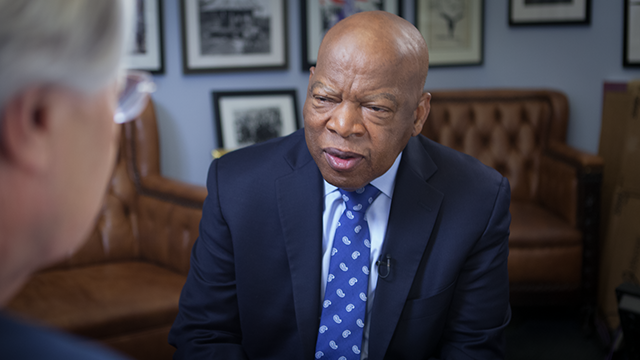Congressman John Lewis was born the son of sharecroppers in rural Alabama. As a young boy he was inspired by the actions of Rosa Parks and others who participated in the Montgomery Bus Boycotts, including Dr. Martin Luther King, Jr., whose speeches he listened to frequently in radio broadcasts. He made a decision early on to actively participate in the civil rights movement.
Lewis began to take his own actions against segregation and inequality as a student at Fisk University, when he led sit-ins at white-only lunch counters. In 1961 he joined the Freedom Riders, a group organized by the Congress of Racial Equality, which challenged segregation in the interstate bus system across the South. He was arrested for his participation in that protest — in which the Riders sat in seats reserved for white patrons — and was beaten severely by angry mobs.
Lewis helped form the Student Nonviolent Coordinating Committee (SNCC) in 1960, and was named Chairman of the organization in 1963. Later that year, he worked with Martin Luther King Jr., A. Philip Randolph and several other leaders of the civil rights movement to organize the historic March on Washington for Jobs and Freedom. The March was attended by a quarter-million people, and was credited with pushing the Johnson Administration to pass the 1964 Civil Rights Act. At the March, Lewis gave one of the most memorable speeches of the day, calling for a “serious social revolution” that would end Jim Crow-era laws and unfair voting restrictions for black Americans.
After the March on Washington, Lewis continued to distinguish himself as a leader of the movement. In 1965 he helped lead an orderly march of over 600 protesters across the Edmund Pettus Bridge in Selma, Alabama, with the intent of continuing on to Montgomery to make the case for African American voting rights. The marchers were attacked by state troopers in a confrontation that became known as Bloody Sunday. Photos of the attacks — including one showing Lewis bleeding from the head — brought national attention to the event and hastened the passage of the 1965 Voting Rights Act.
After leaving SNCC in 1966, Lewis continued his work within the civil rights movement, participating in the Southern Regional Council’s voter registration programs and working as Director of the Voter Education Project. Under his leadership, the VEP added nearly four million minority voters to the rolls.
In 1986, Lewis was elected to represent Georgia’s 5th Congressional District in the U.S. House of Representatives, where he is currently serving his 14th term. He has been honored with many awards throughout his career in public service, including the highest civilian honor, the Medal of Freedom, conferred by President Obama in 2011. He is the author of two memoirs about the civil rights movement, and is co-author of March (Book One), a graphic novel about the era to be published in August 2013.

